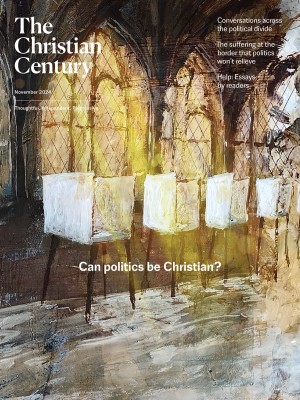November 10, Ordinary 32B (Ruth 3:1-5; 4:13-17)
Naomi is a climate refugee, displaced from her homeland by a natural disaster that results in widespread famine.
As I write this essay I’ve just finished walking my dog in what now feels like a very pleasant and temperate 81 degrees Fahrenheit. Compared to the triple-digit temperatures my area has been experiencing for much of the summer, 81 degrees is a welcome cooldown. But I remember a time when 81 degrees would feel like what it is: hot. For many days this summer, it was too hot to enjoy any of my family’s treasured summertime activities, like going to the pool, sunning ourselves on the beach, or taking in a movie at the drive-in theater. We even had to cancel a family reunion cookout because of a heat advisory. I’ve never experienced that before. These seem like minor inconveniences, first world problems, but they point to a dire situation—one with real threats for all of us, even as it puts those who are already most vulnerable in the deepest peril.
This year is on track to be the hottest on record globally, according to the European Union’s Copernicus Climate Change Service. The International Monetary Fund warns that the economic growth that has helped narrow wealth gaps and reduce poverty could be effectively erased by climate change. A World Bank report estimates that by 2030, somewhere between 68 and 135 million people could be “pushed into poverty” by climate change. The most economically vulnerable in these places—ethnic minorities, children, women, and people of marginalized genders—will feel the effects first and worst. Furthermore, climate disasters create climate refugees, people forced to leave their decimated homes who typically cannot take advantage of existing refugee assistance because of how they’ve been displaced. And migrants and refugees are easily exploited and trafficked.
Read our latest issue or browse back issues.
While famines and droughts promise to grow at unprecedented levels as the climate crisis persists, they are far from new. In the book of Ruth, Naomi is a climate refugee, displaced from her homeland by a natural disaster that results in widespread famine. Though Ruth’s homeland is not impacted, she becomes a climate refugee as well by resolutely connecting her fate to Naomi’s. Both Naomi and Ruth were already marginalized within their respective social locations. Losing a husband or son is even more devastating in a social order in which the men in your family are your only means of protection, provision, and perpetuity. Without them, Naomi and Ruth are exposed to the elements, figuratively naked and at the mercy of kindhearted souls with some resources.
Naomi sets out to secure her daughter-in-law’s future (and her own) by placing an already vulnerable Ruth into another vulnerable situation. Ruth is being asked to risk sexual exploitation and the appearance of impropriety in hopes that Boaz will take pity on her. This is a precarious plan, because it depends solely on the presumed goodness of Boaz and the trust that he will not take advantage of her vulnerability, otherwise humiliate her, or even call for her death.
Like her mother-in-law, Ruth is made naked by famine and forced migration and is now being asked to expose Boaz’s own nakedness. She knows how risky this task is, and I can imagine she might have some misgivings about it. But what choices do these two women have, these women who have done nothing to warrant the situation they’re in? These are the plans of desperate people who were made desperate by a social order that looks down on them because of their gender and their respective ethnicities. (Ruth is a stranger in Israel, as Naomi was in Moab.) And because they are not men, they cannot inherit property or find security without a man, not among either of their peoples.
Ruth has little agency here. She is placed on that threshing floor, both by a famine from her past and by unjust systems of her present. The agency and power rest almost entirely with Boaz. Thank God he chooses to wield that power justly. Many more, however, will not.
Climate disasters like famines, floods, and storms exacerbate marginality. They make things exponentially worse for the people who were already desperate before. We saw this at work after Hurricanes Katrina and Maria, after so many storms named and unnamed. Some have never returned to their homes and communities because “reinvestment” rendered their communities unaffordable and unrecognizable. Too many blue tarps remain on unrepaired roofs. Nakedness often doesn’t get rectified in the aftermath.
Imagine the added injury and injustice if the famine that displaced Naomi had been caused by the same people who created the systems that already made her vulnerable. How we treat creation matters. How we structure our systems matters. There simply aren’t enough kindhearted kinsman redeemers to go around.






